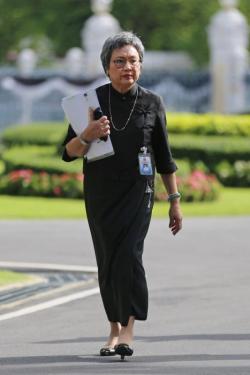Asean and Japan have vowed to speed up talks on the Regional Comprehensive Economic Partnership (RCEP) pact, fearing that US protectionist trade stance may bring negative impacts.
Commerce Minister Apiradi Tantraporn yesterday said Asean economic ministers and Japan's leader have agreed to work for an early establishment of the RCEP and conclude the pact's negotiations by the end of this year.
Mrs Apiradi was speaking after returning from the Asean Economic Ministers (AEM) Roadshow to Japan 2017, held on April 6-9.
"Japan's Prime Minister Shinzo Abe, in particular, has expressed concerns about the possibilities of a wider impact from the US's protectionist stance," she said. "Mr Abe and Asean economic ministers agreed to speed up the conclusion of the pact within this year to stimulate global trade sentiment."
According to Mrs Apiradi, Asean economic ministers are scheduled to meet on May 22-24 in Hanoi with six dialogue partners.
The RCEP was launched in November 2012 with the aim of establishing deeper economic cooperation among the 10 Asean members and six trading partners: China, India, Japan, South Korea, Australia and New Zealand. The member countries represent 29% of global trade.

Mrs Apiradi says Asean economic ministers are working to prevent any adverse impacts from executive orders signed by US President Donald Trump. SEKSAN ROJJANAMETAKUN
The RCEP is now viewed as an alternative to the Trans-Pacific Partnership (TPP) trade agreement, which excludes China and India, and includes several nations from the Americas, after the US decided to pull out of the TPP in January this year.
Twelve Pacific Rim countries, led by the US, concluded the TPP agreement on Oct 5, 2015. TPP countries comprise 40% of global trade.
In 2016, Thailand's total trade value with RCEP countries amounted to US$240 billion, accounting for 59.3% of Thailand's total trade value.
Thai exports to RCEP nations were valued at $120 billion, or 55.7% of total export value.
Imports were worth $122 billion, accounting for 63.3% of total imports.
At the 23rd Asean Economic Ministers Retreat held last month in Manila, Asean members reaffirmed their commitment to cut import tariffs on 90% of products, amounting to 5,000-6,000 items under the RCEP, over the next 15 years.
Asean members also plan to push for the conclusion of negotiations this year.
Mrs Apiradi said the Asean economic ministers have also agreed to beef up the promotion of intra-Asean trading activities to prevent any adverse impacts from executive orders signed by US President Donald Trump.
Regarding Thailand, Mrs Apiradi said trade officials are studying the possible impact from any upcoming measures that might affect Thailand, especially in sensitive areas such as intellectual property, tax and non-tax privileges, and are ready to provide all requested information to the US.
Deputy Prime Minister Somkid Jatusripitak said last week the government expects the country's overall exports to be affected slightly if the US government introduces punitive measures to tackle its trade deficit as pledged.
He said Thailand has a slight trade surplus with the US.
Thailand's trade surplus with the US amounted to $19 billion last year, ranking 11th among the 16 countries the US has trade deficits with. The biggest deficit was with China at $347 billion, followed by Japan ($69 billion) and Germany ($65 billion). Among Asean countries, Vietnam enjoyed a $32-billion trade surplus and Malaysia $25 billion, according to the US Census Bureau.